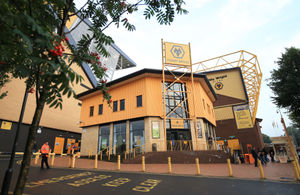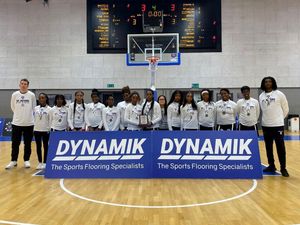Wolves top list of new football banning orders
Wolves fans were issued more football banning orders in the last year than supporters of any other club in England and Wales, new figures have revealed.

A total of 32 orders were made between August last year and July barring Wolves fans from attending matches. This was up from 21 the previous year.
As of August 7, there were 75 existing banning orders in place against the club's fans, the second highest total in the country behind Newcastle United.
The figures are released each year by the Home Office.
In terms of new orders made in the last year, 18 were issued against Birmingham City fans, up from 13 the year before; 11 against Aston Villa fans, up from six; three for Walsall fans, compared to four a year earlier; and none were made against West Bromwich Albion supporters, down from seven during the previous season.
In May nine Wolves supporters and one Birmingham City fan were banned for up to four years after trouble broke out at Molineux.
Coins, bottles and a lighter were thrown, while 80 seats were broken during the Championship fixture in February which saw the Blues win 2-1.
A number of known Wolves hooligans were also banned this year, after violence at an FA Cup qualifying match between Sporting Khalsa and FC United in 2015, while referee and Wolves fan Ryan Grandison was banned in 2016 after being involved in violence and letting off a smoke bomb,
Wolves Head of Operations Steve Sutton said: "We have noted the release of the Home Office banning order figures, with Wolves issuing 32 orders between last August and this July.
"Here at Wolves we are firmly committed to making Molineux a safe and friendly environment for fans to come and enjoy watching football, and work closely with West Midlands Police to ensure that this is the case.
"We proactively liaise with the Police to identify supporters who have other motivations for attending matches, and will support the authorities in applying for banning orders where appropriate.
"The number of banning orders has also served to reduce incidence of disorder at Molineux on a matchday, and reduced our policing costs as a result.
"We remain focused on continuing to provide the sort of atmospheres seen within the stadium this season, where large numbers of supporters are coming and enjoying their football in a safe and positive environment."
The total number of banning orders for each of the clubs' supporters stand at 41 against Blues fans, 31 against Villa fans, 30 against Walsall fans and 16 against fans of The Baggies.
The clubs in England and Wales with the highest number of banning orders on August 7 were:
Newcastle United - 111
Wolverhampton Wanderers - 75
West Ham United - 57
Millwall - 55
Manchester United - 49
Liverpool - 44
Barnsley - 43
Chelsea - 42
Birmingham City - 41
Burnley, Bristol City, Bristol Rovers - 39
Newcastle United fans topped the list of total banning orders for the third consecutive year.
The club, on its return to the Premier League, had 111 banning orders against supporters, a slight decrease from 124 last year.
Meanwhile the number of football-related arrests decreased overall to 1,638 in 2016/17, down 257 compared with the previous year.
Birmingham City had the highest number of fans arrested last season, at 72, followed by Premier League outfit West Ham United with 67.
Elsewhere in the West Midlands, there were 43 Wolves fans arrested, 17 Albion fans, nine Saddlers fans and 52 Villa supporters.
Across the country, the most common cause for arrest was public disorder, which accounted for 31 per cent of incidents, followed by violent disorder, at 21 per cent, and alcohol offences, at 16 per cent.
Football banning orders are civil orders which aim to stop known hooligans causing trouble at and around football matches.




